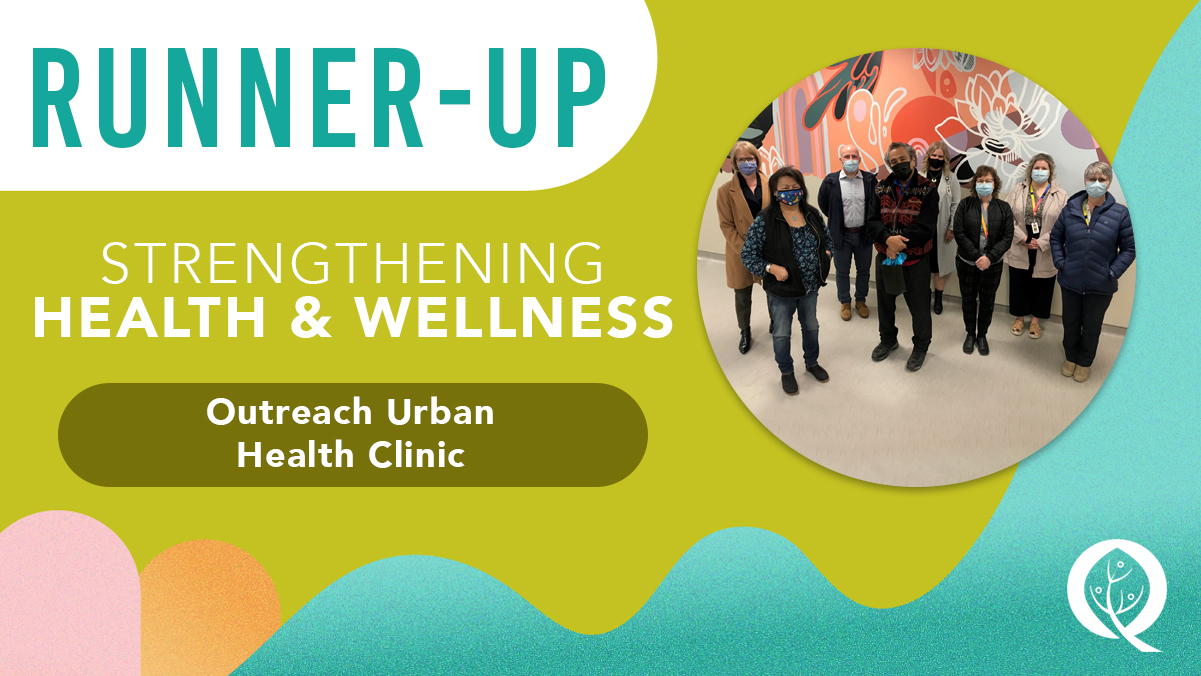- 2023
|
- Runner-Up
|
- Strengthening Health & Wellness
Kelowna is the fastest-growing metropolitan area in Canada, according to 2021 census figures. The influx of population has translated to an increasing demand for health care and social services. At the same time, the province continues to battle a public health emergency due to the toxic drug crisis, and there is evidence of declining mental health due to the ongoing pressures of the COVID-19 pandemic.
Within this trio of concerns, Deborah Preston and the Central Okanagan primary care team could see how this was deeply affecting Kelowna’s marginalized and vulnerable population, a disproportionate number of whom are Indigenous. They believed there was an opportunity to provide a better system of care, one that removed barriers by bringing together primary care, mental health and harm reduction in one location. The result was Interior Health’s Outreach Urban Health (OUH) clinic, which opened March 2021 in downtown Kelowna.
“OUH serves a population of predominantly vulnerable clients including those experiencing homelessness, mental illness, problematic substance use, as well as people without access to traditional health care services, such as new immigrants,” says Deborah. “Co-location of harm reduction, mental health and primary care allows OUH to provide trauma-informed, one-stop-shop services to clients. Removing barriers to care and cross-collaboration across teams has allowed OUH to improve access to services and build trust with clients.”
OUH brings together four teams that previously were dispersed across different locations – supervised consumption services, injectable opioid agonist therapy, assertive community treatment and primary care (including outreach). The clinic was created with a person-first design – the 11,000 square feet facility is situated across from the largest emergency shelter in downtown Kelowna and next to the Ki-Low-Na Friendship centre, and is open seven days a week from 8 a.m. to 10 p.m.
With about 60 health care professionals including family doctors, nurse practitioners, registered nurses, social workers, and mental health and substance use clinicians, the consolidation to one space has removed silos and allowed for expansion of services and the ability to provide true team-based care. They’ve endeavoured to make the space welcoming, inclusive and culturally safe, informed and guided by the perspectives of Indigenous Peoples as well as people with lived and living experience.
They also conducted extensive community engagement, ensuring they are both being good neighbours, and building good relationships with neighbours.
“It has created a space for wellness for a population who traditionally is challenged to access care, or simply won’t access it if they have to go to multiple places – which is especially hard when they are already underhoused and battling substance use or other mental health challenges,” says Deborah.
There have been unmistakable signs of success. Clients feel so safe and supported that they are returning, telling others about OUH, and perhaps most importantly are willing to accept other services they need because they are in the same location. This is key, because they were not accessing health care services previously.
Moreover, OUH was able to provide COVID-19 vaccinations to approx. 1,200 individuals over a two-month period who would not have otherwise had them because they have been traditionally difficult to reach, primarily as a result of being underhoused.
The physical expansion of supervised consumption services into a fixed location from its previous home in a mobile RV unit meant services are now safer, more functional and more private. Visits have increased to 2,600 per month – double the previous number of individuals accessing this service.
Similarly, the injectable opioid agonist treatment (iOAT) service grew to 40 clients from 28 because of increased space and the added ability for drop-in appointments.
And, the increase in the primary care clinic’s footprint to 11,000 square feet from 3,000 sq. ft. has resulted in more than 21,000 visits over a 16-month period, up from 12,000 visits over the same time frame in previous years, and the ability to provide better continuity of care.
“Clients have expressed that they feel more comfortable coming to OUH than any other health care setting,” says Deborah.


